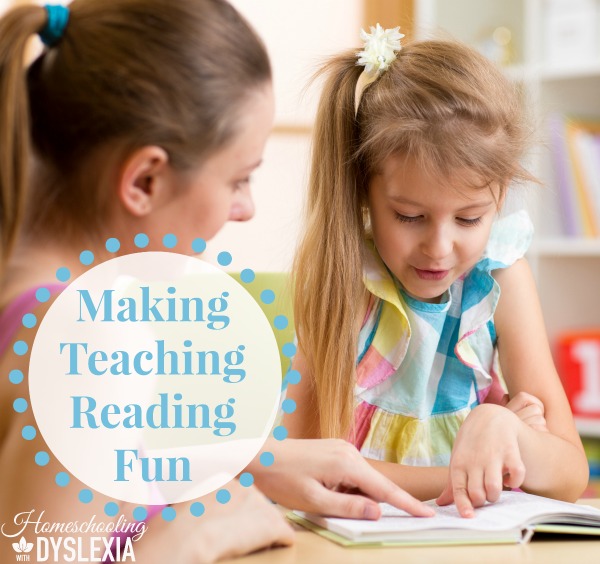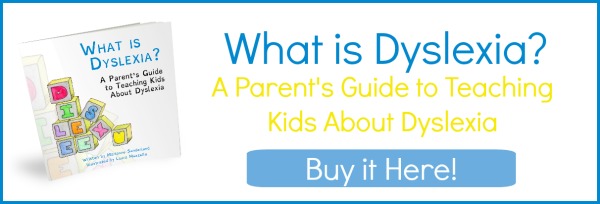Hands up who likes doing things that are difficult, boring or painful?
Right, I thought so. Me neither!
The first thing you need to remember when teaching a child with dyslexia to read is that reading for a dyslexic is difficult – very difficult!
The next thing that you need to know is that research has shown that reading instruction needs to push our kids with dyslexia in order to be effective. Now that you’re totally confused, let me share some ways we make teaching reading intense but fun in our house.
Make Teaching Reading Fun
First of all, you should be using an Orton-Gillingham (O-G) based reading curriculum. If you’re not sure what that is, read this post. Every daily session in an O-G program is broken up into different sections.
Short, quick, lively sections.
The first thing you want to try to do is to keep these sections of your lesson quick and lively when possible. For example, the first thing I do in my reading lessons is to review any phonograms (sounds) my kids need practice with using flashcards. I make a game out of this by trying to change the card before my child can name the sound. Of course, if they are struggling, I can usually slow down without them noticing.
Next, I review their stack of sight words. I move quickly with these as well. Words that they don’t remember well go into a separate stack and I’ll choose 1 or 2 at most to review with our amazingly effective, multi-sensory sight word method. If there are more than 1 or 2, make a note in your planner to work on those next time.
The next thing I teach is whatever rule we are currently working on. So if I’m teaching about open and closed syllables, I build words (or syllables) with our magnetic letter tiles and explain the concept. Then I build more of these words and syllables and ask my child to explain to me whether a syllable is open or closed and why. Kids love to teach.
Make simple sorting games with syllables and words on 3×5 cards with open or closed syllables and have your child sort them into rows according to their type. Keep them moving and keep them talking. Have them explain their thinking. This provides them with continual feedback and positive reinforcement.
Allow time to process while decoding.
Next I review flashcards containing words with the new rule on them. This can be hard. Now you want to slow down and encourage them to use the rule they just practiced. This can take some time and it is important to remember that many dyslexic readers need more time to process what they see and hear. Again, have them explain their thinking and ask questions if their thinking is off.
Teaching Tip: Be sure to review all concepts until your child can apply the rule automatically. This doesn’t mean you can’t move on, you can introduce another rule, but continue to practice each rule until your child is fluent. This way, each daily lesson has a variety of rules and a range of difficulty.
Prep for oral reading.
One of the reasons that I love the O-G program All About Reading, is that the program provides ‘warm up’ pages to prep your child before reading stories in the reader. These warm up pages include words and phrases that will be found in the story. By using these warm up pages we can introduce what will be happening in the story – maybe there is an unusual setting or characters. By prepping the reader for oral reading, they experience more success than if they read the passage or story cold.
Teaching Tip: If your child is getting stressed by reading (remember, this is hard work for them!) find an opportunity to ask them about the characters – what they are doing or feeling. Ask them what they think will happen next. This can help defuse the pressure your child is feeling.
Writing and spelling section
Another reason that I love All About Reading is that they separate spelling and reading instruction. The reason for this is that kids progress much quicker in decoding (reading) than they do in encoding (spelling).
By separating spelling and reading, spelling becomes more review of earlier concepts taught. I have my kids build their spelling words with magnetic letter tiles first. They can explain their thinking and I can give that all-important feedback – asking them to explain their thinking as they go.
Next I dictate their spelling words. Many kids with dyslexia also struggle with dysgraphia – difficulty with handwriting. During spelling, I don’t correct penmanship. Oftentimes kids with dyslexia are thinking so hard about how to spell that they aren’t thinking about penmanship. This can result in their letters being written backwards or a mixture of upper and lower case letters.
Wrap it up.
Before I end a lesson with one of my kids, we take some time to talk about what they learned. While we’re cleaning up I’ll ask them what they liked about their lesson. I make sure to compliment their hard work – and sometimes offer a reward or treat for that hard work. Research has shown that praising effort rather than outcome has a profound affect on a child’s mindset.
Let them experience success.
Giving students continuous feedback and positive reinforcement will help them develop improved self-confidence and improved motivation with reading and writing. As they see success in reading and spelling they will believe they are smart and can learn.







I have been reading everything on your site and stalking your posts, HAHA! We are a homeschooling family of 7. Our youngest daughter 6 has dyslexia and your site has been a haven to myself, as well as, my husband. As soon as we can we plan on taking your education classes. It has been a learning experience for us. We had to research learning styles/tech years ago when we started homeschooling because our oldest son has autism. Our oldest son is now 13 and doing wonderfully. I pray that we can do the same for all our children, as well as, our littlest now with her struggle. We are using All About Reading Pre-Level she is learning her ABC’s and trying so hard to grasp the sounds. Thank you again for this wonderful site!